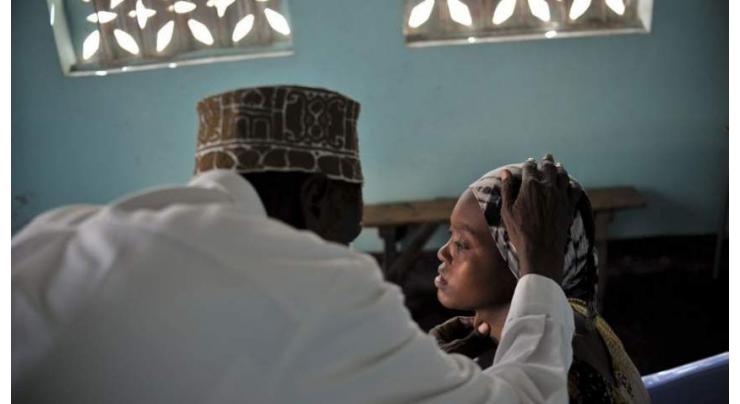
UN Agencies Join Hands To Implement Global Program For GBV Survivors
Umer Jamshaid Published August 29, 2017 | 11:35 PM

Pakistan, Under the leadership of UN Resident Coordinator Neil Bhune, UN Women, UN Office on Drugs and Crimes (UNODC)
ISLAMABAD, (UrduPoint / Pakistan Point News - 29th Aug, 2017 ) : Pakistan, Under the leadership of UN Resident Coordinator Neil Bhune, UN Women, UN Office on Drugs and Crimes (UNODC), UN Population Fund (UNFPA) and World Health Organization (WHO) on Tuesday, signed contracts to roll out the joint global program on Essential Services Package (ESP) for women and girls subjected to violence in Pakistan.
The program aims to provide greater access to a coordinated set of essential and quality multi -sectoral services for all women and girls who have experienced Gender-Based Violence (GBV). Pakistan has been selected as the pilot country for Phase II of the global program on ESP, said a press release on Tuesday.
The activities under this initiative will be jointly implemented by UN Women, UNODC, UNFPA and WHO in 2017-2018 with UN Women as the coordinating agency. During Phase I of the program (2013-2016), global guidelines and tools for multi-sectoral services for GBV survivors were developed.
These will now be tested in pilot countries as part of Phase II. In his opening remarks, UN Resident Coordinator, Neil Bhune appreciated the joint initiative to end violence against women in Pakistan.
`Violence against women is not only a travesty of women's dignity and rights but also a tragic cost to families, communities, and countries. Preventing that violence and providing services to those who are affected, is both a necessity and a modest investment to help women have more opportunities so that no one is left behind.' Speaking on this occasion, UN Women Country Representative, Jamshed Kazi, said the provision of essential services to gender- based violence survivors is a step towards ensuring their protection and rehabilitation and preventing violence from reoccurring.
"These services, with the support of legal reforms and policies, can result in a transformative change by addressing the root causes of violence to bring about women empowerment and gender equality in the country." WHO Country Representative, Dr.
Mohammad Assai Ardakani, welcomed the partnership and said that the joint UN initiative is an opportunity for UN agencies to contribute and work together in ending violence against women. "The SDGs are centered on the idea of `leave no one behind.' We cannot have women left behind in health, development and the well-being because they are experiencing violence, discrimination, poverty and gender inequality.
Together we can address this serious public health problem and improve the health and well-being of women and girls." Officer Incharge UNODC, Danilo Campisi, said that Police have a Primary role to play in preventing violence against women and promoting access to justice.
"UNODC welcomes the opportunity to collaborate with UN agencies for strengthening the rule of law and improving Police services for survivors of gender-based violence." Deputy Representative UNFPA, Sarah Masale, said that UNFPA supports countries to achieve universal access to sexual and reproductive health and to realize sexual and reproductive rights of women, adolescents, and youth.
"Central to this mission is to ensure gender equality, empowerment of all women and girls, and reproductive rights, by ending GBV and harmful practices in development and humanitarian settings.
We consider, the global standards for essential services for women and girls subjected to violence, a vital tool for ensuring these rights," she said. About Essential Services Package (ESP): The ESP comprises five modules - overview and introductions, health, justice and policing, social services, and coordination and governance of coordination, along with a sixth module, a companion "implementation guide" intended to assist in the implementation of the package.
Overall, the program identifies the need for providing essential services within health, social services, police, and justice sectors as well as guidelines for the coordination of essential services and the governance of coordination processes and mechanisms.
Related Topics
Recent Stories

Dubai Police Marks International Workers' Day with 'Talabat' Riders

Sharjah Ruler inaugurates 15th annual Sharjah Children’s Reading Festival

Parineeti Chopra opens up about her decision to marry politician Raghav Chadha

PCB decides to set up training camp for national team ahead of England, Ireland ..

Virat Kohli's sweet birthday wish for Anushka Sharma

Interior Minister commends Pakistan Coast Guards

Pakistan women’s squad announced for England tour

Punjab CM Maryam inaugurates initiative of field hospitals

PM Shehbaz constitutes committee to investigate caretaker govt’s wheat import ..

Women T20I: Pakistan to face West Indies in fourth match tomorrow

Pak-UK 6th Regional Stabilization Conference underway at NDU, Islamabad

World Labor Day being observed today
More Stories From Pakistan
-
IG inquires after health of injured police officials
57 minutes ago -
Govt focuses on working class needs: Dastgir
3 hours ago -
Advocating for labour right is PPP’s legacy: Nasir Hussain
3 hours ago -
Massive rallies mark May Day in Rawalpindi
3 hours ago -
PM keen to resolve issues of farmers: Rana Tanveer
3 hours ago -
PDP holds protest in Srinagar against BJP regime’s divisive tactics in IIOJK
3 hours ago
-
Government committed to serve labourers at all cost: Rana Sana
4 hours ago -
Muqam visits graveyard of martyred soldier Azam Khan
4 hours ago -
Rich tributes paid to martyrs of Chicago
4 hours ago -
BLLFP stresses importance of enforcing minimum wage laws
4 hours ago -
President for strict action against criminals in Sindh
4 hours ago -
President orders strict action against criminals in Sindh
4 hours ago